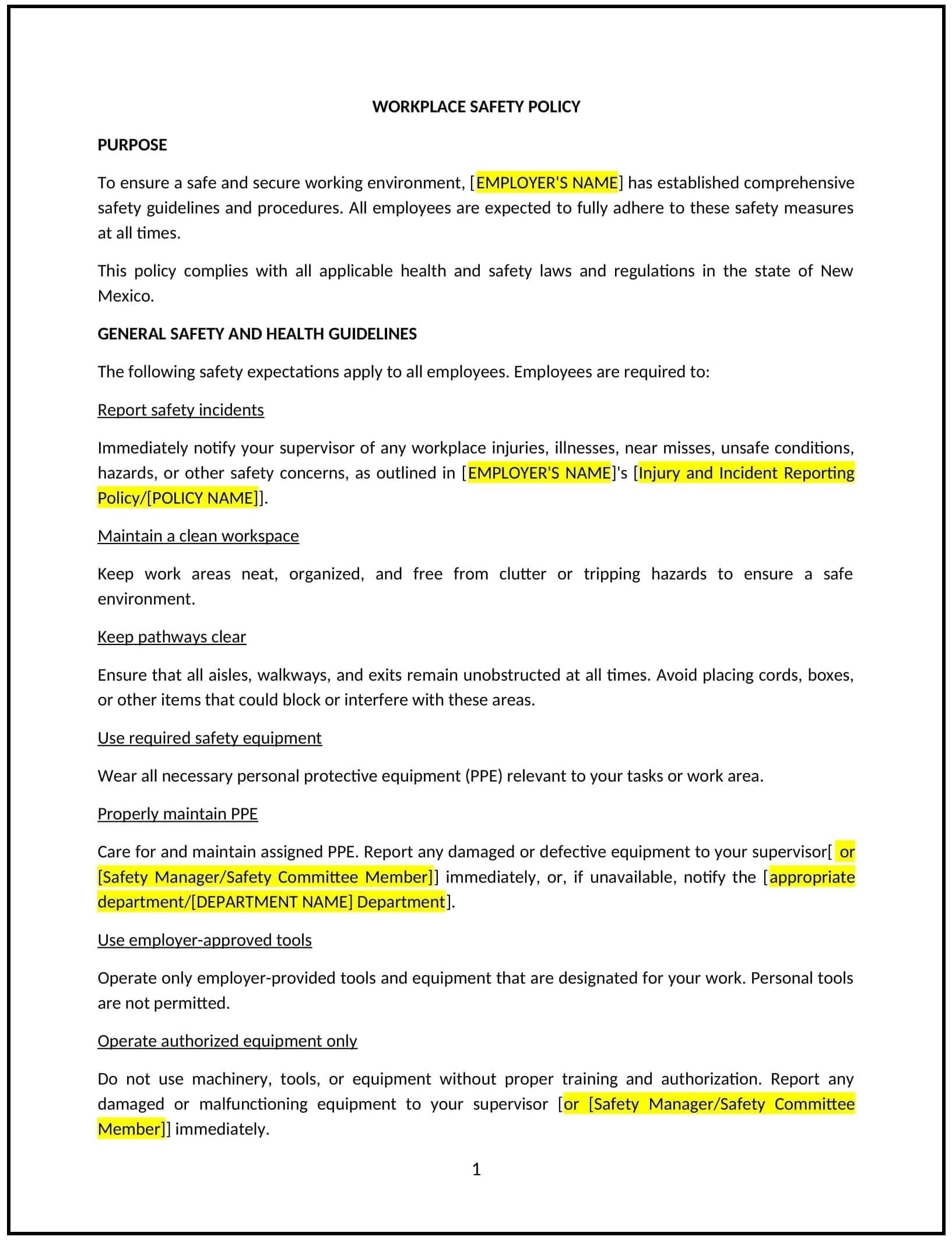Workplace safety policy (New Mexico): Free template
Got contracts to review? While you're here for policies, let Cobrief make contract review effortless—start your free review now.

Customize this template for free
Workplace safety policy (New Mexico)
A workplace safety policy helps New Mexico businesses create and maintain a safe and healthy work environment for employees, customers, and visitors. This policy outlines the steps to prevent accidents, manage risks, and respond to emergencies, while ensuring compliance with state and federal safety regulations. It is designed to minimize hazards, reduce workplace injuries, and promote a culture of safety and well-being within the organization.
By adopting this policy, businesses in New Mexico can enhance workplace safety, improve employee morale, and reduce the risk of accidents and legal liabilities.
How to use this workplace safety policy (New Mexico)
- Define workplace safety: Clearly outline what constitutes a safe work environment, including the identification of hazards, safety protocols, and the roles of employees and management in maintaining safety.
- Establish risk assessment procedures: Implement procedures for identifying, evaluating, and mitigating workplace hazards to prevent injuries and accidents.
- Set safety standards: Outline specific safety standards and regulations relevant to the business, including equipment, machinery, and procedures employees must follow to minimize risks.
- Provide safety training: Require regular safety training for all employees, ensuring they understand safety protocols, emergency procedures, and how to report potential hazards or unsafe conditions.
- Develop emergency response plans: Create clear emergency procedures, including evacuation plans, first aid protocols, and how to handle workplace incidents such as fires, accidents, or medical emergencies.
- Encourage reporting: Establish a clear process for employees to report safety concerns, accidents, or unsafe practices without fear of retaliation.
- Monitor and enforce: Regularly monitor safety practices, conduct audits, and enforce the policy to ensure ongoing compliance with safety standards and regulations.
- Review and update: Periodically review the policy and update it to reflect changes in New Mexico safety laws, business operations, or emerging risks.
Benefits of using this workplace safety policy (New Mexico)
This policy provides several benefits for New Mexico businesses:
- Reduces workplace accidents: Clear safety protocols and risk assessments help prevent accidents and injuries, leading to a safer environment for employees.
- Enhances employee well-being: A focus on safety promotes a healthy work environment and shows employees that their well-being is a priority.
- Improves productivity: A safe workplace leads to fewer disruptions, allowing employees to work more efficiently without the concerns of accidents or injuries.
- Minimizes legal risks: A strong workplace safety policy helps businesses reduce the risk of lawsuits, workers' compensation claims, and regulatory penalties related to unsafe working conditions.
- Promotes a culture of safety: By establishing clear safety procedures and expectations, businesses can create a culture where safety is prioritized, leading to increased employee satisfaction and engagement.
Tips for using this workplace safety policy (New Mexico)
- Communicate the policy effectively: Ensure all employees are aware of the safety protocols, the importance of following safety guidelines, and how they can report concerns.
- Regularly conduct safety training: Offer ongoing safety training and refreshers to ensure employees stay informed of new hazards and the latest safety practices.
- Foster a safety-first culture: Encourage employees to take ownership of safety in the workplace and actively contribute to identifying and addressing risks.
- Document safety incidents: Keep detailed records of any accidents or near-misses to help identify patterns, track progress, and improve future safety measures.
- Review safety standards periodically: Stay up-to-date with New Mexico's workplace safety regulations and update the policy as necessary to remain compliant and responsive to new challenges.